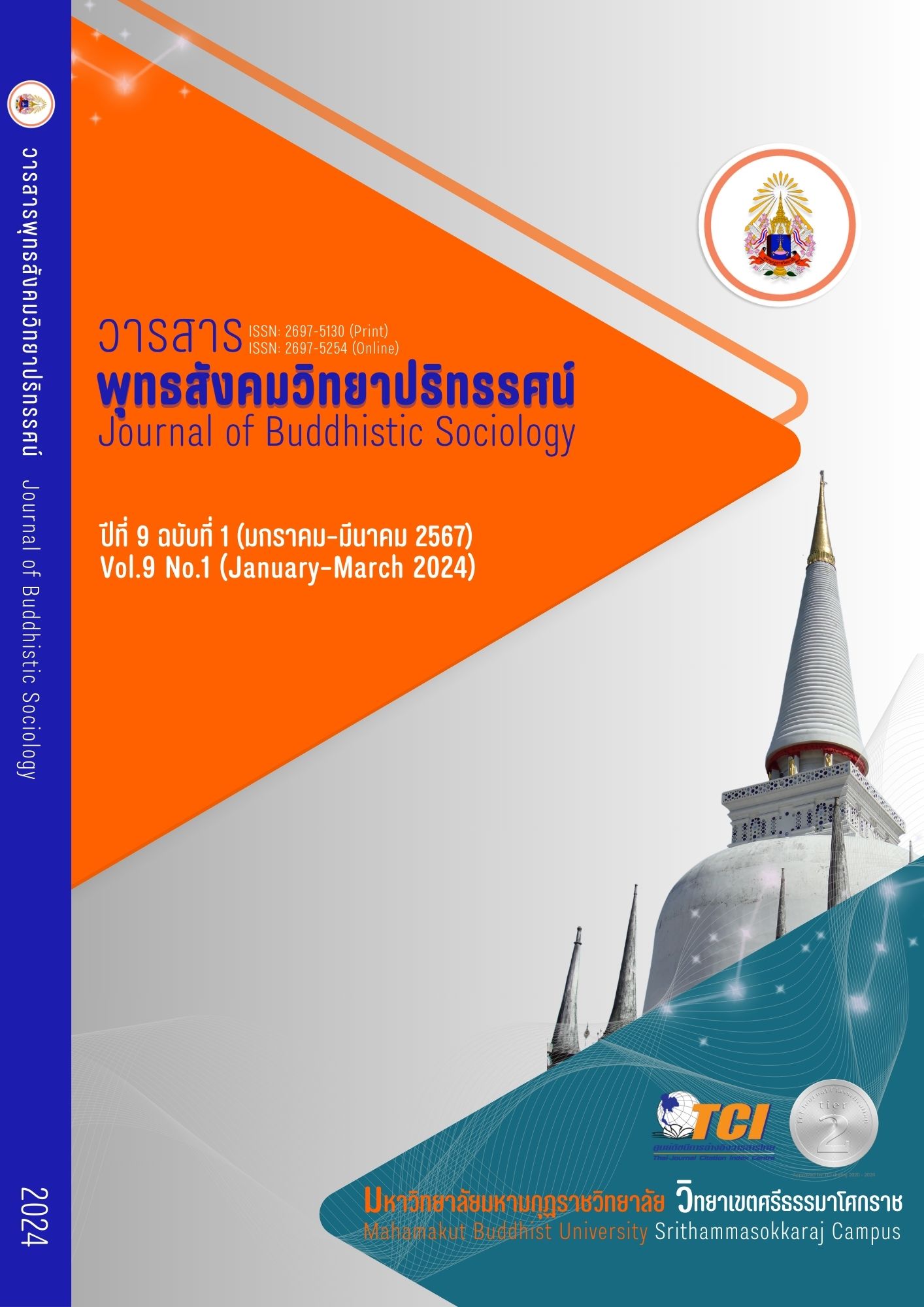THE LIFE QUALITY DEVELOPMENT WITH BAVANA PRINCIPLE OF ELDERS IN SANAMCHAI SUB – DISTRICT, SATHINGPHRA DISTRICT, SONGKHLA PROVINCE
Main Article Content
Abstract
This research aimed to study 1) the quality-of-life development of the elderly, 2) the quality-of-life development of the elderly under the 4 Bhavana principles, and 3) guidelines for improving the quality of the elderly's life under the 4 Bhavana principles. This qualitative research used in-depth interviews and focus group discussions to collect the data. The key informants were divided into 20 elderly key informants and 15 persons from focus group discussions in the Sanam Chai subdistrict, Sathingphra District, Songkhla Province. Data were analyzed using the content analysis technique.
The results showed that:
- The quality-of-life development of the elderly: The elderly must consider holistically and apply the integration of medical and scientific sciences, along with the psychological and Buddhist principles, as a practical guideline suitable for improving the quality of life of the elderly in physical and mental aspects, including social and environmental relationships.
- The quality-of-life development of the elderly under the 4 Bhavana principles: The elderly improved their self-care for physical health, enhanced relationships with others, had a compassionate and empathetic mindset, generosity, and sacrifice for society's benefits. They also realized that we are born, grow old, fall ill, and die following the truths of life under the Buddhist principles.
- The guidelines for improving the quality of life for elderly people under the 4 Bhavana principles: The most effective way to utilize the 4 Bhavana principles as guidelines for enhancing the quality of life of elderly people was through coordinated teamwork and cooperation from the elderly, family members, temples, and government agencies to strengthen the quality of life in physical, morality, mental well-being, and intellect as practical guidelines for implementation.
Article Details

This work is licensed under a Creative Commons Attribution-NonCommercial-NoDerivatives 4.0 International License.
References
นวินดา นิลวรรณ และคณะ. (2563). การประยุกต์ใช้หลักภาวนา 4 ตามแนวพระพุทธศาสนาเถรวาทสู่สังคมผู้สูงอายุ. วารสารมหาจุฬานาครทรรศน์, 7(3), 38-49.
พระพรหมคุณาภรณ์ (ป.อ.ปยุตฺโต). (2548). ธรรมนูญชีวิต (ฉบับชาวบ้าน). กรุงเทพมหานคร: ธรรมสภา.
พระมหาเชาวฤทธิ์ นรินฺโท (ทรัพย์สวัสดิ์) และคณะ. (2562). การศึกษาแนวทางการพัฒนาคุณภาพชีวิตผู้สูงอายุตามหลักภาวนา 4 กรณีศึกษา: ผู้สูงอายุบ้านห้วยหอย ตำบลธาตุทอง อำเภอภูเขียว จังหวัดชัยภูมิ. วารสารบัณฑิตศึกษามหาจุฬาขอนแก่น, 6(1), 58-72.
พระสราวุฒิ ปญฺญาวุฑฺโฒ. (2560). การพัฒนาคุณภาพชีวิตของผู้สูงอายุตามแนวพระพุทธศาสนาในเขตเทศบาลตำบลวังหงส์ อำเภอเมือง จังหวัดแพร่. วารสาร มจร พุทธปัญญาปริทรรศน์, 55-66.
สุพาภรณ์ กันยะติ๊บ. (2560). หลักพุทธธรรมกับการสร้างเสริมสุขภาพของผู้สูงอายุ: กรณีศึกษา สถานปฏิบัติธรรมแห่งหนึ่ง. ใน วิทยานิพนธ์สาธารณสุขศาสตรมหาบัณฑิต สาขาวิชาการจัดการสร้างเสริมสุขภาพ. มหาวิทยาลัยธรรมศาสตร์.
อาชัญญา รัตนอุบล. (2559). การเรียนรู้ของผู้ใหญ่และผู้สูงอายุในสังคมไทย. กรุงเทพมหานคร: โรงพิมพ์แห่งจุฬาลงกรณ์มหาวิทยาลัย.


